For John David's Keez Beez, the Buzz is On
By Laura Myers
Keez Beez, known as "America's southernmost professional beekeepers," is gaining buzz for leading a growing movement of Florida Keys organic foods made from sustainable, locally-sourced products.
Seven years ago, Keez Beez co-owner Isabella Ballestas, a former civil engineer, surprised her newly retired husband John David, a former deep-sea captain, with a single hive for his 60th birthday.
The couple had recently retired to Marathon's Sombrero Isle from Coral Gables, Fla., after raising their children Emmanuel and Sandra, who are now grown professionals.
On fishing and scuba trips, the couple had stopped at Boot Key Harbor when traveling on their 60-foot Sea Ray to the Marquesas and Dry Tortugas. They found Sombrero Isle and chose to settle in the Keys.
"We love the climate. People seem more relaxed, more patient and more polite — it's like going back 50 years in time," David said.
"I only got six months of retirement," he added. "We kept that first beehive on our balcony and it produced so much honey we didn't know what to do with it all."
The hobby grew into a passion. David admitted that the fascination of working with bees can become an addiction.
"We have both learned so much about the flora and fauna of the Keys, the beautiful intricacy of a complex but very fragile eco-system like the Florida Keys, and the important part that honeybees play," David said. "We feel that we are doing something important for nature and the environment — unnoticed by most people, but important nevertheless."
Keez Beez has more than 600 organic hives in 12 locations from Key Largo to Big Pine Key. Each hive produces up to 200 pounds of raw, dark amber-colored honey annually.
For 2017 the company is projected to produce more than 200,000 pounds of raw honey and honey products, with sales to reach $2 million.
Outlets include Whole Foods, Publix, Winn-Dixie and Milam's Market grocery stores, Playa Largo Resort & Spa in Key Largo and several properties in The Ritz-Carlton hotel chain.
David and Ballestas work on the road, tending to the hives and overseeing a Miami-area processing facility and licensed bottling and distribution center. They hand-deliver Keez Beez goods to farmers' markets and outlets throughout Florida.
"Once we got into beekeeping and had several dozen hives, we had less and less time for anything else. Eventually we even sold our boat," David said.
He's not the first beekeeper in his family. He grew up on a five-acre farm in southern England, helping his grandfather tend to bees.
"As a kid, I hated it," he said. "I was always getting stung. But today's bees are very different. They're much gentler and not as aggressive."
David and Ballestas met 26 years ago in Puerto la Cruz, Venezuela. She was overseeing a refinery water treatment project and he was captain of an oil tanker.
His first command, at age 27, was in 1978 on an 18,000-ton bulk carrier for U.S. Gypsum Co., running from Canada to the Caribbean, U.S. and Mexico.
David gradually became an "Arctic expert" as captain of Canada's only school ship, the 12,500-ton Sunemerillion, in the early 1980s. His crew consisted of officer cadets from Quebec's marine institute. He navigated Arctic high seas during summers with icebergs, an icebreaker escort, unreliable charts and 50-foot tides.
His last Artic trip was in 1988 as captain of a 7,000-ton Canadian vessel for a journey above the Arctic Circle to supply Eskimo villages and military defense early warning stations.
Today his focus is on Keez Beez honey — made from nectars of flowering trees such as red and black mangrove, sea grape, wild tamarind, Brazilian pepper and Jamaican dogwood and bottled straight from the honeycomb. The chemical-free honey is certified by Kosher Organics and the Non-GMO Project in Bellingham, Wash.
The bees, isolated from the mainland by open water and ocean breezes, have no exposure to pesticides, fungicides, algaecides, herbicides and antibiotics. Bees typically fly no farther than three miles from a hive.
From late May through July, thousands of acres of black mangrove come into bloom throughout the Keys' state and national parks. Several apiaries are located near or adjacent to the parks, including Long Key.
"The Florida Keys have more flowering trees and flowers than anywhere else north of the Mexican border," David said. "Honeybees really do help the environment. Bees do a lot of good but people are sometimes cautious. You can co-exist without causing problems."
Besides honey, other Keez Beez products are a honey dipper or swizzle stick for dissolving honey in hot beverages, beeswax and beeswax candles, straight-from-the-hive honeycombs, soaps made from honey, chocolate, Key lime and coconut oil; lip balm, skin exfoliant, and anti-bacterial propolis made from beeswax and resinous materials.
"We just got bigger and bigger," David said. "I don't know how to stop it."
Despite changing the course of his planned retirement, David's Florida Keys career has proved intriguing, challenging and satisfying.
Added David, "Being retired is deadly boring and greatly over-rated!"
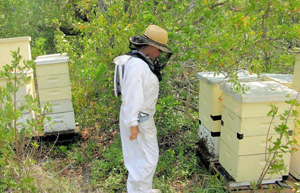
Isabella Ballestas tends to some of their 600 organic hives throughout 12 locations in the Keys.
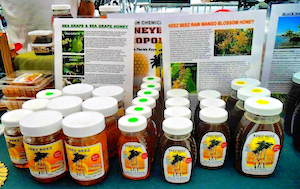
David and Ballestas hand-deliver Keez Beez goods to farmers’ markets and outlets throughout Florida.
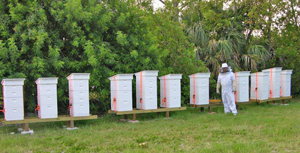
John David, a former deep-sea captain, was given a single hive for his 60th birthday, and admits that the fascination of working with bees can become an addiction.
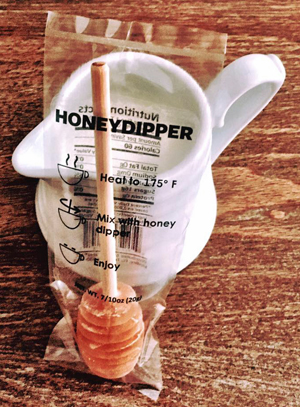
Keez Beez products include a honey dipper or swizzle stick for dissolving honey in hot beverages.
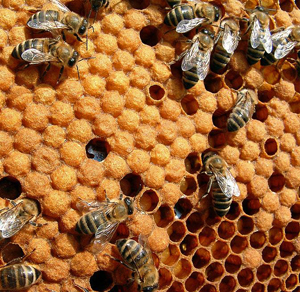
Honeybees really do help the environment, according to David. Humans and bees can coexist harmoniously.

